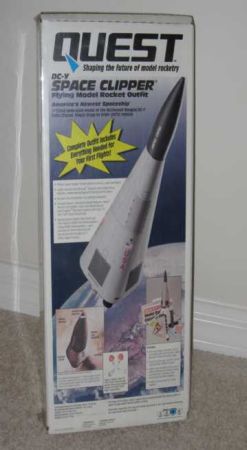Quest DC-Y Space Clipper
Quest - DC-Y Space Clipper {Kit} (3004)
Contributed by Hans "Chris" Michielssen
| Construction Rating: | starstarstarstarstar_border |
| Flight Rating: | starstarstar_borderstar_borderstar_border |
| Overall Rating: | starstarstarstar_borderstar_border |
| Diameter: | 4.00 inches |
| Length: | 13.50 inches |
| Manufacturer: | Quest  |
| Skill Level: | 3 |
| Style: | Futuristic/Exotic |
Brief:
I won this on eBay for $10.00. This is the entire, unopened Quest starter kit with launcher, launch controller, kit and 3 C6-3 engines. It was packaged in the mid-1990s. I didn't expect the engines to be included, but they were sent.
I'd always liked the simplicity of the Quest PVC Tripod launcher. The older hand-held controller was very comfortable and ergonomic. I might use this for my new utility "home" launcher.
I had seen the Space Clipper years ago. The model looked interesting, and might be a great odd-ball build.
Everyone always makes claim to a great buy on eBay. I guess this was mine.
Construction:
This model used Conical Stabilty with no fins. Two 12" parachutes are used, one is for the nose cone alone as it is heavy with all the clay nose weight.
The yellow engine mount tube and centering rings seem thin. You are instructed to make a slight bend in the engine hook. There was already a slight bend in the hook. Instead of wrapping tape around the engine hook, I substituted a Semroc HR-20 mylar retaining ring.
Many of the black cardstock frame pieces had already become free from the die-cut frame. There were a few attachment tabs that required trim and sanding.
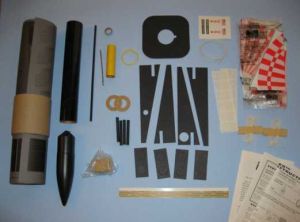 The marking guide is cut from the instruction sheet. I fit nearly perfect around the tube. Because the tube is pre-colored black, it doesn't accept pencil marking lines well. The lines were more of a "scribe" down the tube.
The marking guide is cut from the instruction sheet. I fit nearly perfect around the tube. Because the tube is pre-colored black, it doesn't accept pencil marking lines well. The lines were more of a "scribe" down the tube.
The lug is also pre-colored black. It's 8-½" long and runs the entire length of the inside body tube. I scraped the lug line on the body tube and sanded the lug gluing line to ensure a good adhesion.
The Base Plate hole is a larger diameter than the body tube. While the instructions direct you to "push" the tube into the large hole, it loosely slips right through. You can see light through the joint on all sides. I decided to tack the base in place with glue drops on three sides, not on the launch lug side yet. Also, the hole for the lug is larger than the lug diameter.
When gluing the internal frames, I found it easier to line them up by looking down from the top. I had my doubts about the strength of the internal structure. At first it was a little hard to get the frames to line up. But after the white glue started to set up, they held in place well.
Other reviews have talked of how weak these tubes are. Many have replaced them with dowels. The kit tubes seemed just as strong as a 1/4" dowel. I went ahead and used the supplied tubes.
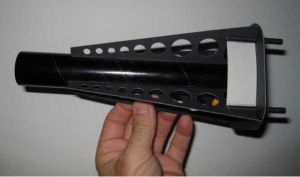 The supplied black gussets weren't wide enough to reach both sides the landing tubes. The tubes do need to glue to a gusset for strength. I ended up cutting wider gussets from cereal box cardboard.
The supplied black gussets weren't wide enough to reach both sides the landing tubes. The tubes do need to glue to a gusset for strength. I ended up cutting wider gussets from cereal box cardboard.
Even though the kit was probably 15 years old, the double faced tape strip was still very usable. The adhesive transferred well and the joined shroud edges are strong.
Earlier, the shroud was ironed flat and pre-formed. On the printed face there is a horizontal line with rivets on either side. Instead of trying to line up the top or bottom first, I lined up this horizontal line. This stuck the shroud together in the middle first and joined from the middle out. Being it was a long tab, this seemed to be a easier way to go.
I had built X-24 Bugs before and the Quest HL-20. It seemed every time the shroud is not perfectly round, there can be problems with fit at the bottom. Not so here.
I had no problems getting the shroud over the base plate. Fillets were applied to the rounded corners first. On the "flats" I came back and applied fillets but needed a little masking tape to hold the shroud edge to the base.
I made sure to lessen the tackiness of the tape by sticking the tape to my jeans and pulling it up (several times) before laying it on the paper shroud. By sticking the tape to my jeans, it pulls jean fiber onto the tape and diminishes its stickiness. I didn't want to pull up any paper when removing the tape.
Around the top of the lug, the shroud "lifts" slightly away from the shroud/tube joint. I used a small drop of CA glue to hold the edge down. I also touched a small drop of CA at the top and bottom of the shroud seam.
The instructions have you cut a "hole" with a razor saw into the plastic adapter shoulder. I decided to simply widen the small hole already in the base. With a knife and small file I made the hole about 1/4" round.
The clay was old and very oily on the outside. It was still usable though. It was rolled into a thin clay "snake" and push into the nose with a dowel. With all the clay in place, it's heavy! No wonder the nose cone comes down on its own parachute.
The molding seams on the outside of the cone were noticeable. I used sandpaper to remove them and smooth it out.
Two 12" parachutes are provided. I've read a few stories about the stiffness of he Quest parachutes. Some have had trouble getting the parachutes to open at ejection. I will fly the model as directed by the instructions, however, I'll be sure to let the parachutes air out right before launch. If the Quest chutes don't work out, I've installed snap swivels on both and will switch them out for another brand.
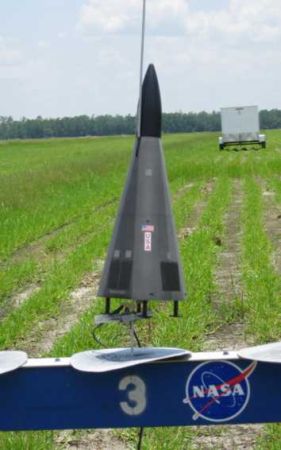
Finishing:
There is no painting involved. The pre-printed shroud looks great. As others have written, the decals are not so good. They are self-adhesive stickers, not waterslide.
The package illustrations show the USA decal to be in red, only red, against the grey shroud. These stickers are on a white background, not clear. Used as supplied, the USA decal is surrounded by a white rectangular box. The other stickers could be cut close and appear as in the photograph but with a raised surface.
Construction Rating: 4 out of 5
Flight:
NEFAR was having their "Half-Blast" near Bunnell, Florida on June 13, 2009. The two parachutes took up more space than the model had room for. I packed the wadding a little tighter to make room for the two parachutes.
I set up the Clipper on the low-power rack with a Estes C6-3. There were two "no go" launches as someone had kicked the power cable loose. The igniter was still fine. Third try was good. The Clipper rose straight up for about 50 feet then turned 45 degrees and flew diagonally to the west. Ejection was fine, no damage except for a slight bend in one of the legs. The leg is repairable. I don't think I'll fly it again, it didn't seem very stable, or safe.
Recovery:
CONs: Not enough room for the wadding and two parachutes. There was a small bend on one landing leg tube.
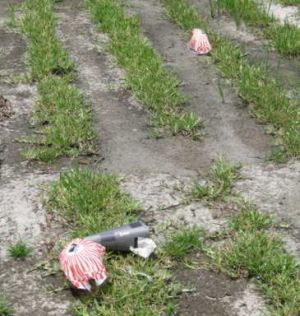
Flight Rating: 2 out of 5
Summary:
PROs: Fun build, definitely different. Great fit of the large shroud. Nice display model.
CONs: Bad fit of landing gear gussets. Sticker "decals." Weak, thin centering rings and motor mount tube. Heavy nosecone with all the clay weight. Not very stable. I would probably reinforce the tube landing legs, maybe with gluing a dowel inside the hollow tubes.
Overall Rating: 3 out of 5
Other Reviews
- Quest DC-Y Space Clipper By Matt Gillard (March 7, 2009)
An OOP rocket of the Space Clipper from Quest. A scale rocket, it has no fins and is a lifting body. Stability is achieved by placing a ton of mass up in the nose cone. Recovers via two parachutes. Parts list: Motor clip Blue thrust ring Yellow motor mount tube 2 Centering rings Black die cut parts sheet 8.5-inch black body tube black plastic nose cone 8.5-inch ...
- Quest DC-Y Space Clipper By Jim Moncher
Brief Paper shroud construction and dual chute recovery. Construction This was the first Quest kit I have built and was pleased with almost all aspects. The kit came in the common bag; no parts were missing or broken. This kit is a finless, Skill Level 3 features paper shroud construction and dual 12-inch parachute recovery. More on the 'chutes later. The instructions were easy to follow ...
 |
 |
Flights
 |
 |
